The Effects of Cultural Change on Romanian Immigrants' Wellbeing
VerifiedAdded on 2023/01/19
|49
|12135
|24
Thesis and Dissertation
AI Summary
This dissertation investigates the experiences of Romanian migrants in the United Kingdom, focusing on the impact of cultural change on their professional identities and overall wellbeing. The study explores the motivations behind migration, the utilization of migrants' skills, and the sociological hardships they face, including cultural deviation and its effects on mental health. Using a grounded theory research philosophy and an inductive approach, the research employs a descriptive design and interview strategy to analyze the migrants' status. The findings highlight the need for a more tolerant and friendly environment within the UK, supported by government policies and societal attitudes. The research examines the context of European migration, specifically addressing the influx of Romanian migrants after restrictions were lifted in 2014. This research provides valuable insights into the challenges and opportunities faced by Romanian immigrants, contributing to a deeper understanding of migration's multifaceted impacts on individuals and society.
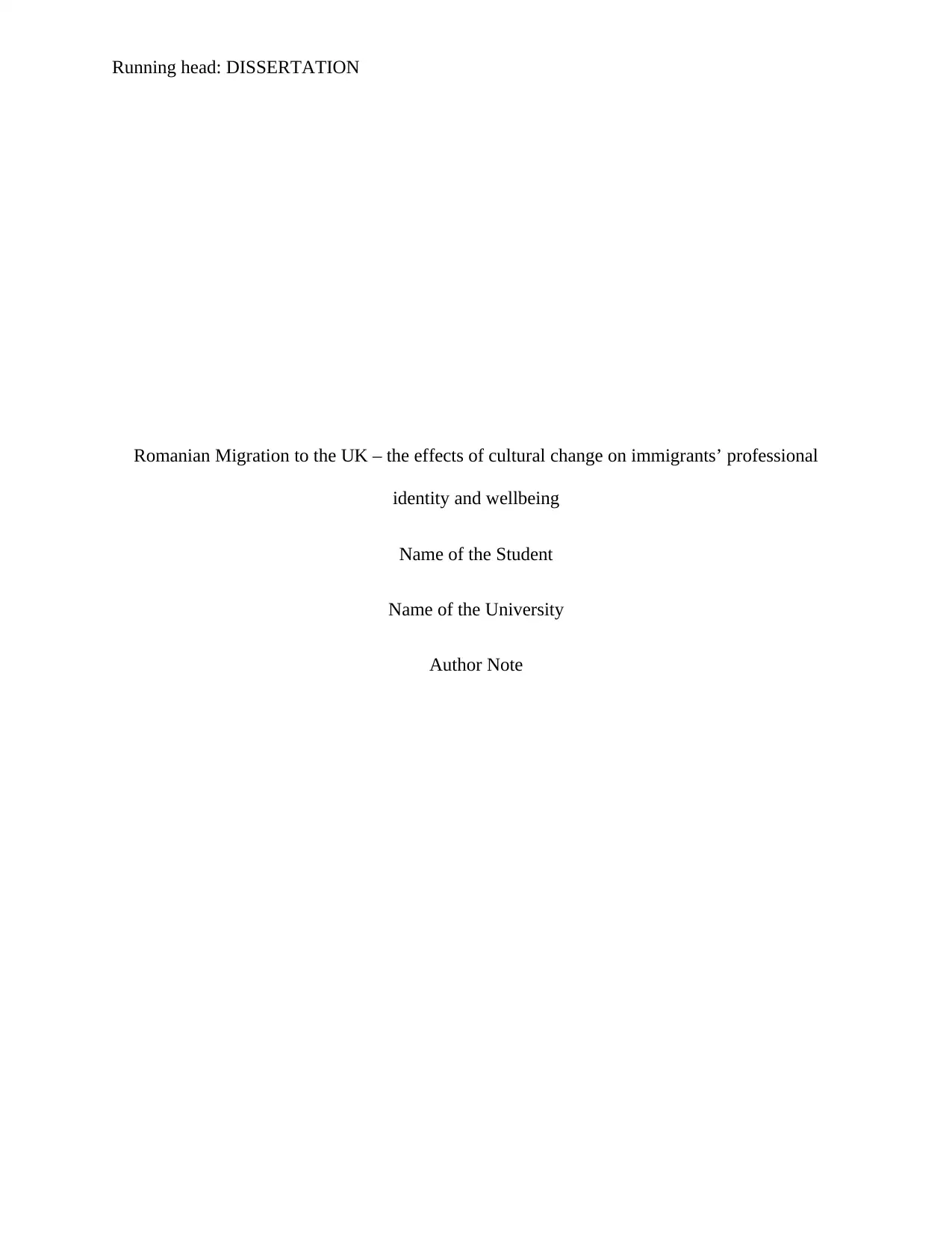
Running head: DISSERTATION
Romanian Migration to the UK – the effects of cultural change on immigrants’ professional
identity and wellbeing
Name of the Student
Name of the University
Author Note
Romanian Migration to the UK – the effects of cultural change on immigrants’ professional
identity and wellbeing
Name of the Student
Name of the University
Author Note
Paraphrase This Document
Need a fresh take? Get an instant paraphrase of this document with our AI Paraphraser
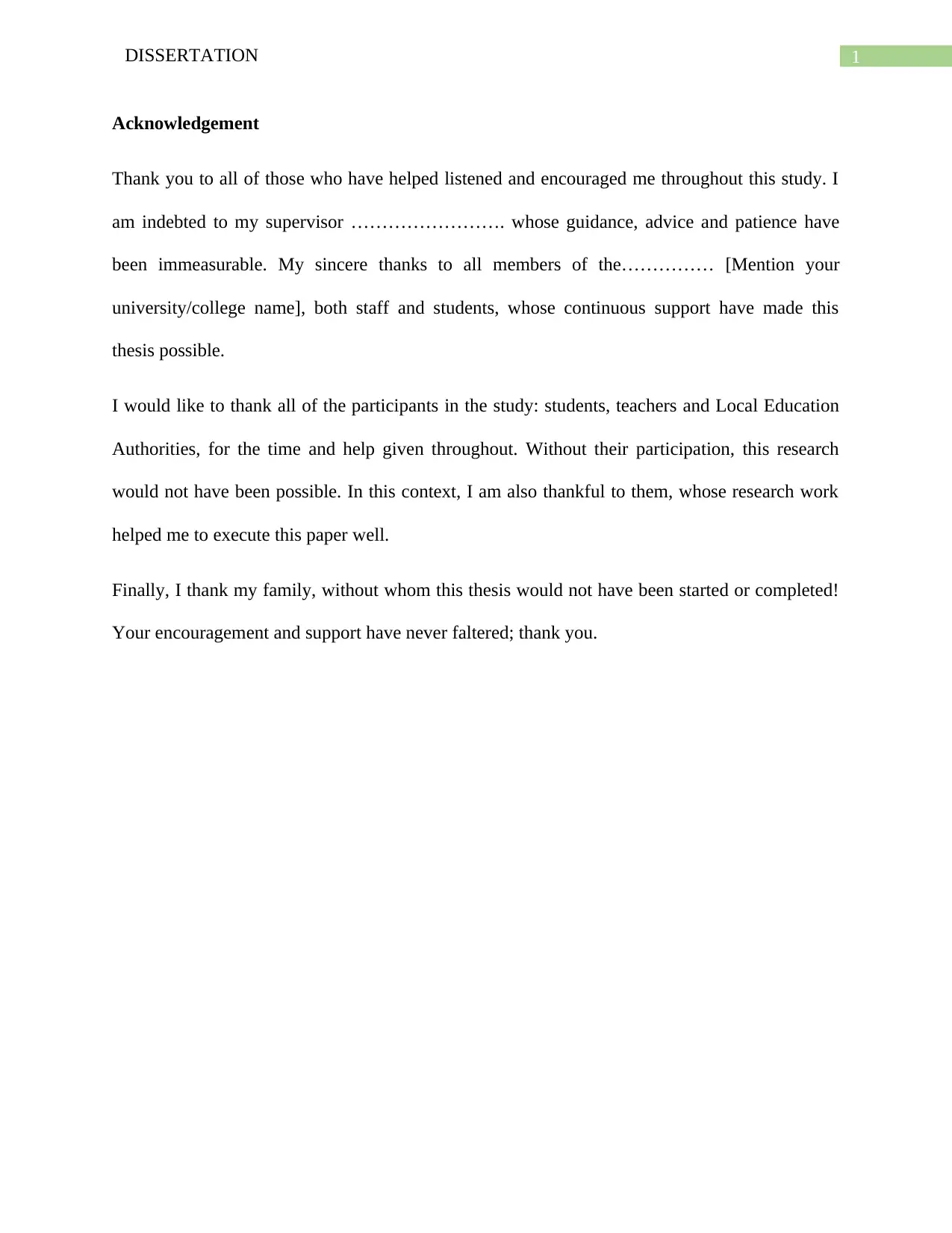
1DISSERTATION
Acknowledgement
Thank you to all of those who have helped listened and encouraged me throughout this study. I
am indebted to my supervisor ……………………. whose guidance, advice and patience have
been immeasurable. My sincere thanks to all members of the…………… [Mention your
university/college name], both staff and students, whose continuous support have made this
thesis possible.
I would like to thank all of the participants in the study: students, teachers and Local Education
Authorities, for the time and help given throughout. Without their participation, this research
would not have been possible. In this context, I am also thankful to them, whose research work
helped me to execute this paper well.
Finally, I thank my family, without whom this thesis would not have been started or completed!
Your encouragement and support have never faltered; thank you.
Acknowledgement
Thank you to all of those who have helped listened and encouraged me throughout this study. I
am indebted to my supervisor ……………………. whose guidance, advice and patience have
been immeasurable. My sincere thanks to all members of the…………… [Mention your
university/college name], both staff and students, whose continuous support have made this
thesis possible.
I would like to thank all of the participants in the study: students, teachers and Local Education
Authorities, for the time and help given throughout. Without their participation, this research
would not have been possible. In this context, I am also thankful to them, whose research work
helped me to execute this paper well.
Finally, I thank my family, without whom this thesis would not have been started or completed!
Your encouragement and support have never faltered; thank you.
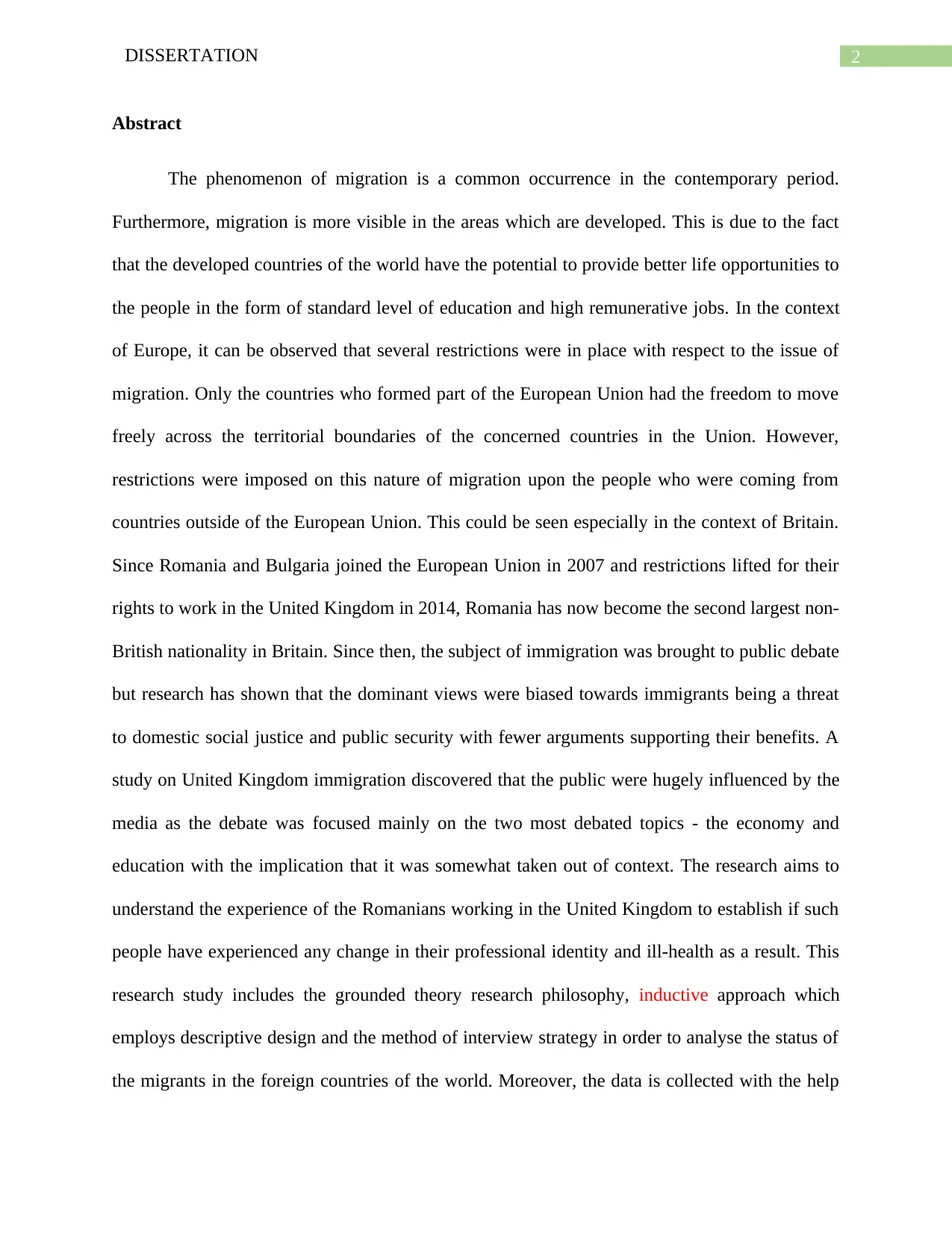
2DISSERTATION
Abstract
The phenomenon of migration is a common occurrence in the contemporary period.
Furthermore, migration is more visible in the areas which are developed. This is due to the fact
that the developed countries of the world have the potential to provide better life opportunities to
the people in the form of standard level of education and high remunerative jobs. In the context
of Europe, it can be observed that several restrictions were in place with respect to the issue of
migration. Only the countries who formed part of the European Union had the freedom to move
freely across the territorial boundaries of the concerned countries in the Union. However,
restrictions were imposed on this nature of migration upon the people who were coming from
countries outside of the European Union. This could be seen especially in the context of Britain.
Since Romania and Bulgaria joined the European Union in 2007 and restrictions lifted for their
rights to work in the United Kingdom in 2014, Romania has now become the second largest non-
British nationality in Britain. Since then, the subject of immigration was brought to public debate
but research has shown that the dominant views were biased towards immigrants being a threat
to domestic social justice and public security with fewer arguments supporting their benefits. A
study on United Kingdom immigration discovered that the public were hugely influenced by the
media as the debate was focused mainly on the two most debated topics - the economy and
education with the implication that it was somewhat taken out of context. The research aims to
understand the experience of the Romanians working in the United Kingdom to establish if such
people have experienced any change in their professional identity and ill-health as a result. This
research study includes the grounded theory research philosophy, inductive approach which
employs descriptive design and the method of interview strategy in order to analyse the status of
the migrants in the foreign countries of the world. Moreover, the data is collected with the help
Abstract
The phenomenon of migration is a common occurrence in the contemporary period.
Furthermore, migration is more visible in the areas which are developed. This is due to the fact
that the developed countries of the world have the potential to provide better life opportunities to
the people in the form of standard level of education and high remunerative jobs. In the context
of Europe, it can be observed that several restrictions were in place with respect to the issue of
migration. Only the countries who formed part of the European Union had the freedom to move
freely across the territorial boundaries of the concerned countries in the Union. However,
restrictions were imposed on this nature of migration upon the people who were coming from
countries outside of the European Union. This could be seen especially in the context of Britain.
Since Romania and Bulgaria joined the European Union in 2007 and restrictions lifted for their
rights to work in the United Kingdom in 2014, Romania has now become the second largest non-
British nationality in Britain. Since then, the subject of immigration was brought to public debate
but research has shown that the dominant views were biased towards immigrants being a threat
to domestic social justice and public security with fewer arguments supporting their benefits. A
study on United Kingdom immigration discovered that the public were hugely influenced by the
media as the debate was focused mainly on the two most debated topics - the economy and
education with the implication that it was somewhat taken out of context. The research aims to
understand the experience of the Romanians working in the United Kingdom to establish if such
people have experienced any change in their professional identity and ill-health as a result. This
research study includes the grounded theory research philosophy, inductive approach which
employs descriptive design and the method of interview strategy in order to analyse the status of
the migrants in the foreign countries of the world. Moreover, the data is collected with the help
⊘ This is a preview!⊘
Do you want full access?
Subscribe today to unlock all pages.

Trusted by 1+ million students worldwide
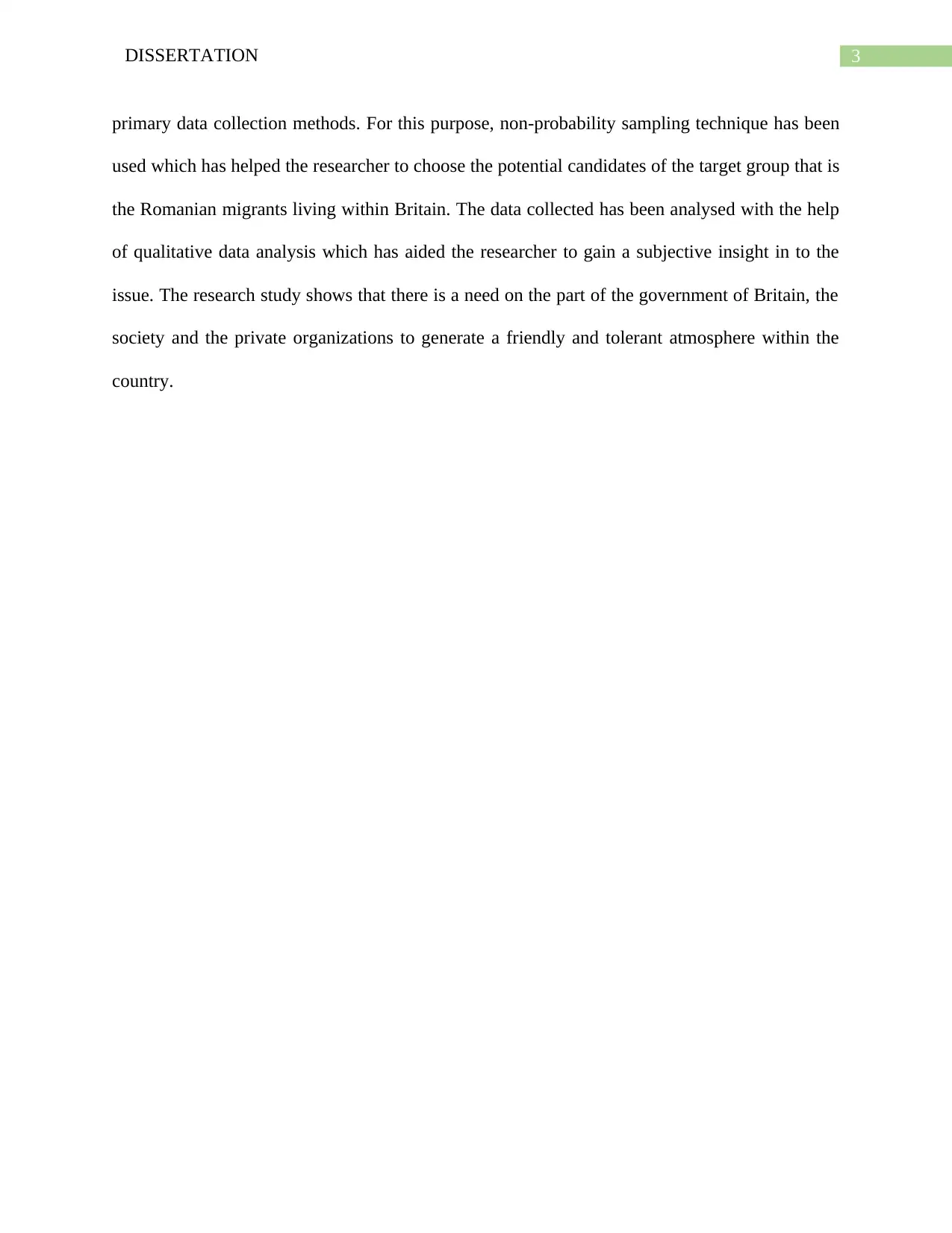
3DISSERTATION
primary data collection methods. For this purpose, non-probability sampling technique has been
used which has helped the researcher to choose the potential candidates of the target group that is
the Romanian migrants living within Britain. The data collected has been analysed with the help
of qualitative data analysis which has aided the researcher to gain a subjective insight in to the
issue. The research study shows that there is a need on the part of the government of Britain, the
society and the private organizations to generate a friendly and tolerant atmosphere within the
country.
primary data collection methods. For this purpose, non-probability sampling technique has been
used which has helped the researcher to choose the potential candidates of the target group that is
the Romanian migrants living within Britain. The data collected has been analysed with the help
of qualitative data analysis which has aided the researcher to gain a subjective insight in to the
issue. The research study shows that there is a need on the part of the government of Britain, the
society and the private organizations to generate a friendly and tolerant atmosphere within the
country.
Paraphrase This Document
Need a fresh take? Get an instant paraphrase of this document with our AI Paraphraser
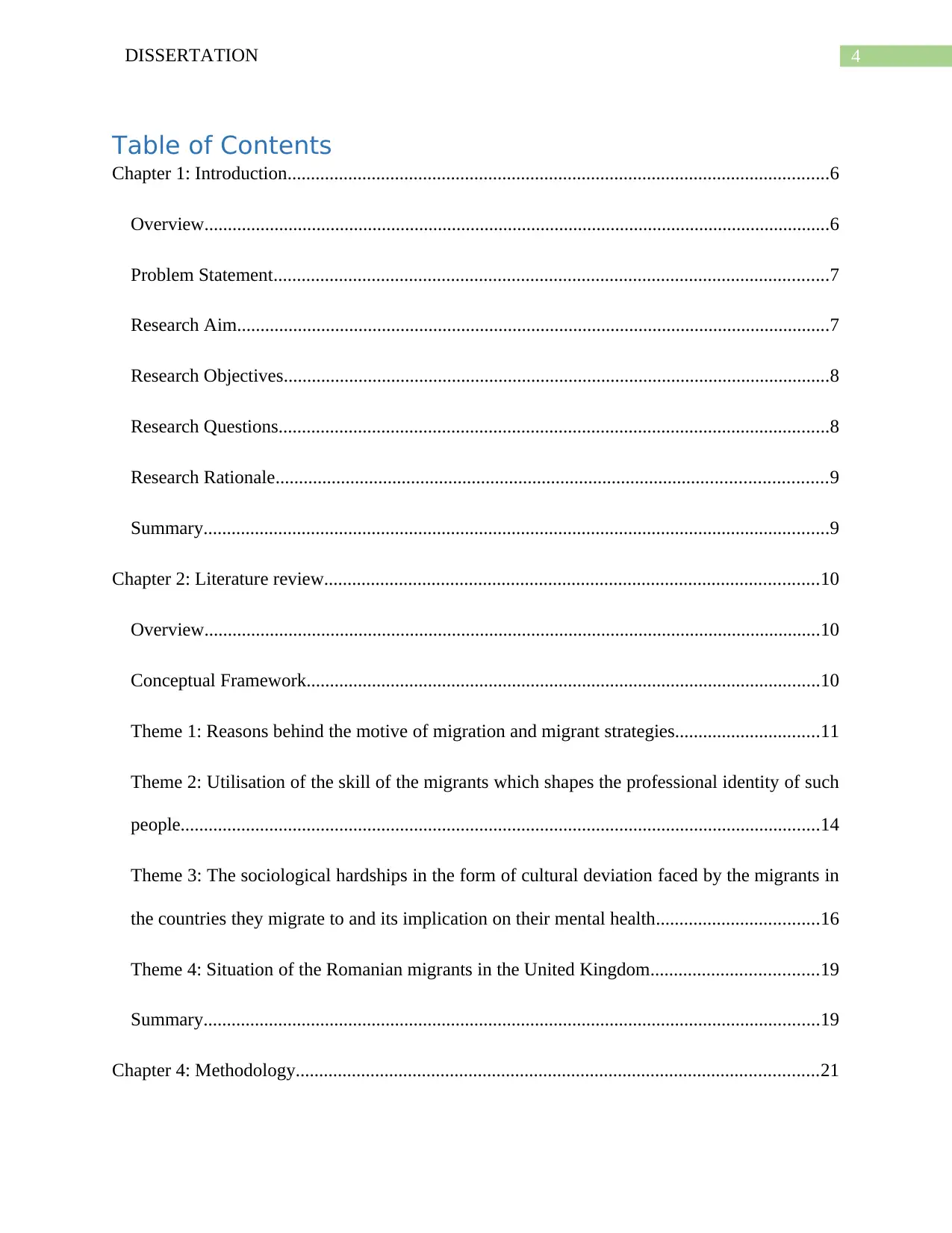
4DISSERTATION
Table of Contents
Chapter 1: Introduction....................................................................................................................6
Overview......................................................................................................................................6
Problem Statement.......................................................................................................................7
Research Aim...............................................................................................................................7
Research Objectives.....................................................................................................................8
Research Questions......................................................................................................................8
Research Rationale......................................................................................................................9
Summary......................................................................................................................................9
Chapter 2: Literature review..........................................................................................................10
Overview....................................................................................................................................10
Conceptual Framework..............................................................................................................10
Theme 1: Reasons behind the motive of migration and migrant strategies...............................11
Theme 2: Utilisation of the skill of the migrants which shapes the professional identity of such
people.........................................................................................................................................14
Theme 3: The sociological hardships in the form of cultural deviation faced by the migrants in
the countries they migrate to and its implication on their mental health...................................16
Theme 4: Situation of the Romanian migrants in the United Kingdom....................................19
Summary....................................................................................................................................19
Chapter 4: Methodology................................................................................................................21
Table of Contents
Chapter 1: Introduction....................................................................................................................6
Overview......................................................................................................................................6
Problem Statement.......................................................................................................................7
Research Aim...............................................................................................................................7
Research Objectives.....................................................................................................................8
Research Questions......................................................................................................................8
Research Rationale......................................................................................................................9
Summary......................................................................................................................................9
Chapter 2: Literature review..........................................................................................................10
Overview....................................................................................................................................10
Conceptual Framework..............................................................................................................10
Theme 1: Reasons behind the motive of migration and migrant strategies...............................11
Theme 2: Utilisation of the skill of the migrants which shapes the professional identity of such
people.........................................................................................................................................14
Theme 3: The sociological hardships in the form of cultural deviation faced by the migrants in
the countries they migrate to and its implication on their mental health...................................16
Theme 4: Situation of the Romanian migrants in the United Kingdom....................................19
Summary....................................................................................................................................19
Chapter 4: Methodology................................................................................................................21
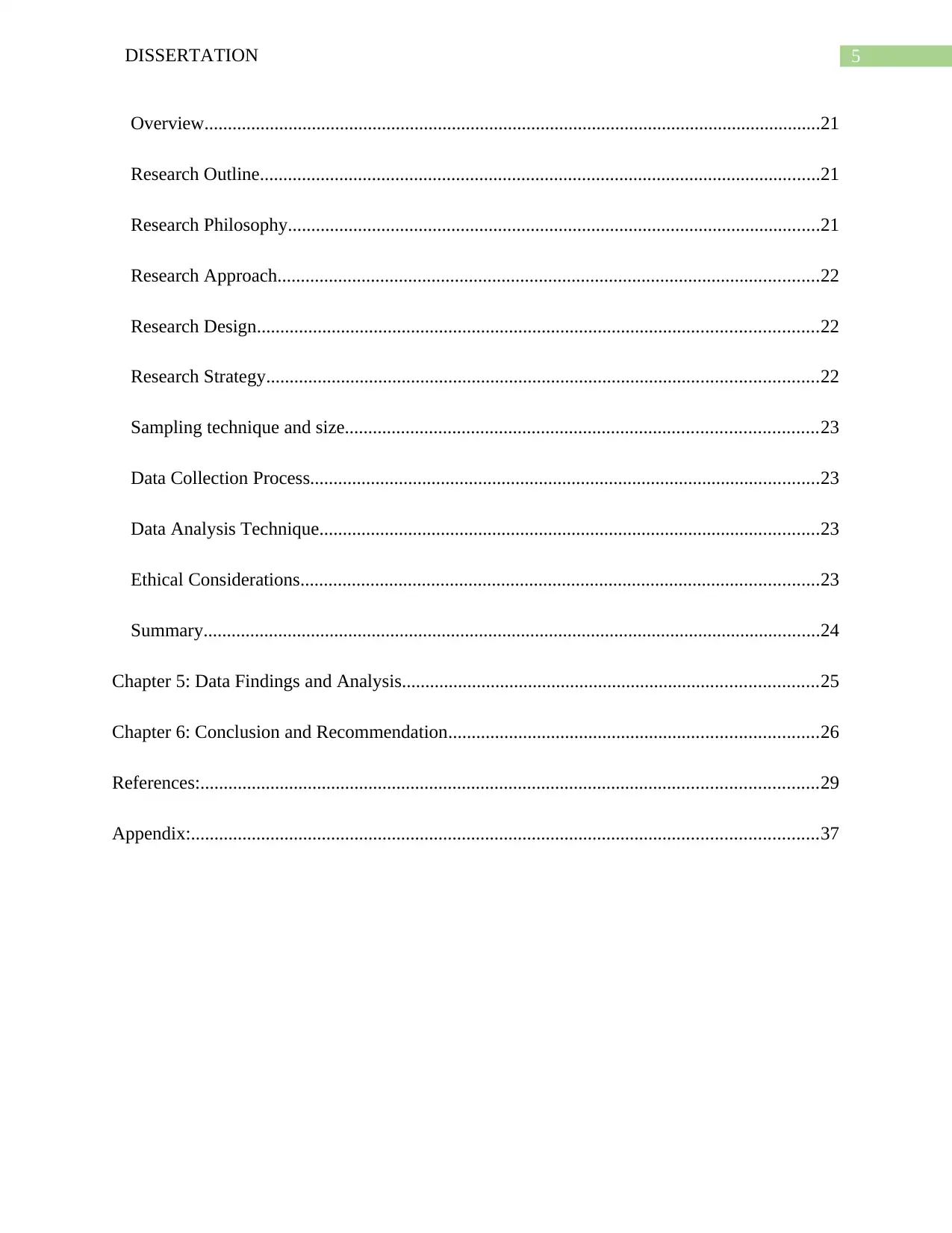
5DISSERTATION
Overview....................................................................................................................................21
Research Outline........................................................................................................................21
Research Philosophy..................................................................................................................21
Research Approach....................................................................................................................22
Research Design........................................................................................................................22
Research Strategy......................................................................................................................22
Sampling technique and size.....................................................................................................23
Data Collection Process.............................................................................................................23
Data Analysis Technique...........................................................................................................23
Ethical Considerations...............................................................................................................23
Summary....................................................................................................................................24
Chapter 5: Data Findings and Analysis.........................................................................................25
Chapter 6: Conclusion and Recommendation...............................................................................26
References:....................................................................................................................................29
Appendix:......................................................................................................................................37
Overview....................................................................................................................................21
Research Outline........................................................................................................................21
Research Philosophy..................................................................................................................21
Research Approach....................................................................................................................22
Research Design........................................................................................................................22
Research Strategy......................................................................................................................22
Sampling technique and size.....................................................................................................23
Data Collection Process.............................................................................................................23
Data Analysis Technique...........................................................................................................23
Ethical Considerations...............................................................................................................23
Summary....................................................................................................................................24
Chapter 5: Data Findings and Analysis.........................................................................................25
Chapter 6: Conclusion and Recommendation...............................................................................26
References:....................................................................................................................................29
Appendix:......................................................................................................................................37
⊘ This is a preview!⊘
Do you want full access?
Subscribe today to unlock all pages.

Trusted by 1+ million students worldwide
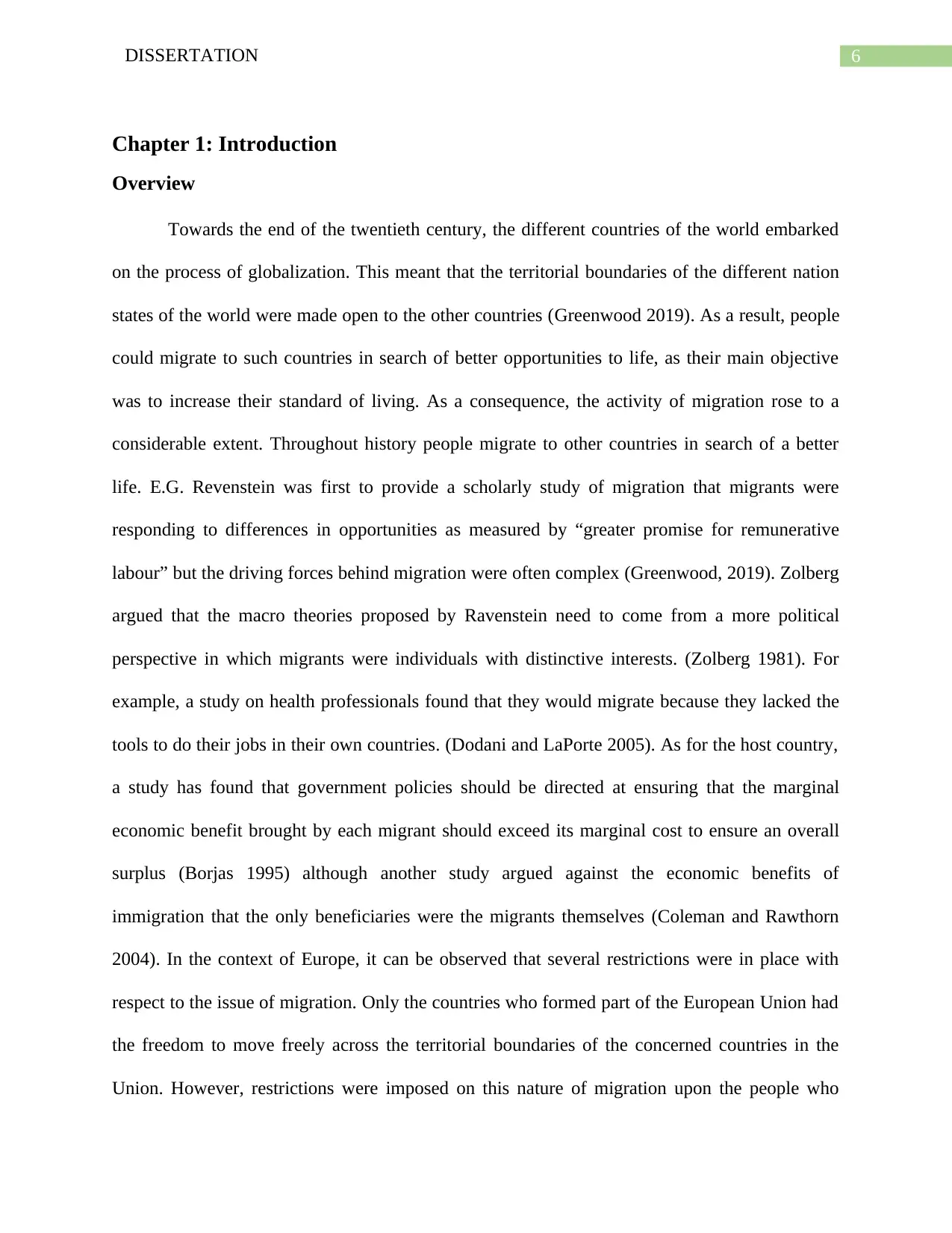
6DISSERTATION
Chapter 1: Introduction
Overview
Towards the end of the twentieth century, the different countries of the world embarked
on the process of globalization. This meant that the territorial boundaries of the different nation
states of the world were made open to the other countries (Greenwood 2019). As a result, people
could migrate to such countries in search of better opportunities to life, as their main objective
was to increase their standard of living. As a consequence, the activity of migration rose to a
considerable extent. Throughout history people migrate to other countries in search of a better
life. E.G. Revenstein was first to provide a scholarly study of migration that migrants were
responding to differences in opportunities as measured by “greater promise for remunerative
labour” but the driving forces behind migration were often complex (Greenwood, 2019). Zolberg
argued that the macro theories proposed by Ravenstein need to come from a more political
perspective in which migrants were individuals with distinctive interests. (Zolberg 1981). For
example, a study on health professionals found that they would migrate because they lacked the
tools to do their jobs in their own countries. (Dodani and LaPorte 2005). As for the host country,
a study has found that government policies should be directed at ensuring that the marginal
economic benefit brought by each migrant should exceed its marginal cost to ensure an overall
surplus (Borjas 1995) although another study argued against the economic benefits of
immigration that the only beneficiaries were the migrants themselves (Coleman and Rawthorn
2004). In the context of Europe, it can be observed that several restrictions were in place with
respect to the issue of migration. Only the countries who formed part of the European Union had
the freedom to move freely across the territorial boundaries of the concerned countries in the
Union. However, restrictions were imposed on this nature of migration upon the people who
Chapter 1: Introduction
Overview
Towards the end of the twentieth century, the different countries of the world embarked
on the process of globalization. This meant that the territorial boundaries of the different nation
states of the world were made open to the other countries (Greenwood 2019). As a result, people
could migrate to such countries in search of better opportunities to life, as their main objective
was to increase their standard of living. As a consequence, the activity of migration rose to a
considerable extent. Throughout history people migrate to other countries in search of a better
life. E.G. Revenstein was first to provide a scholarly study of migration that migrants were
responding to differences in opportunities as measured by “greater promise for remunerative
labour” but the driving forces behind migration were often complex (Greenwood, 2019). Zolberg
argued that the macro theories proposed by Ravenstein need to come from a more political
perspective in which migrants were individuals with distinctive interests. (Zolberg 1981). For
example, a study on health professionals found that they would migrate because they lacked the
tools to do their jobs in their own countries. (Dodani and LaPorte 2005). As for the host country,
a study has found that government policies should be directed at ensuring that the marginal
economic benefit brought by each migrant should exceed its marginal cost to ensure an overall
surplus (Borjas 1995) although another study argued against the economic benefits of
immigration that the only beneficiaries were the migrants themselves (Coleman and Rawthorn
2004). In the context of Europe, it can be observed that several restrictions were in place with
respect to the issue of migration. Only the countries who formed part of the European Union had
the freedom to move freely across the territorial boundaries of the concerned countries in the
Union. However, restrictions were imposed on this nature of migration upon the people who
Paraphrase This Document
Need a fresh take? Get an instant paraphrase of this document with our AI Paraphraser
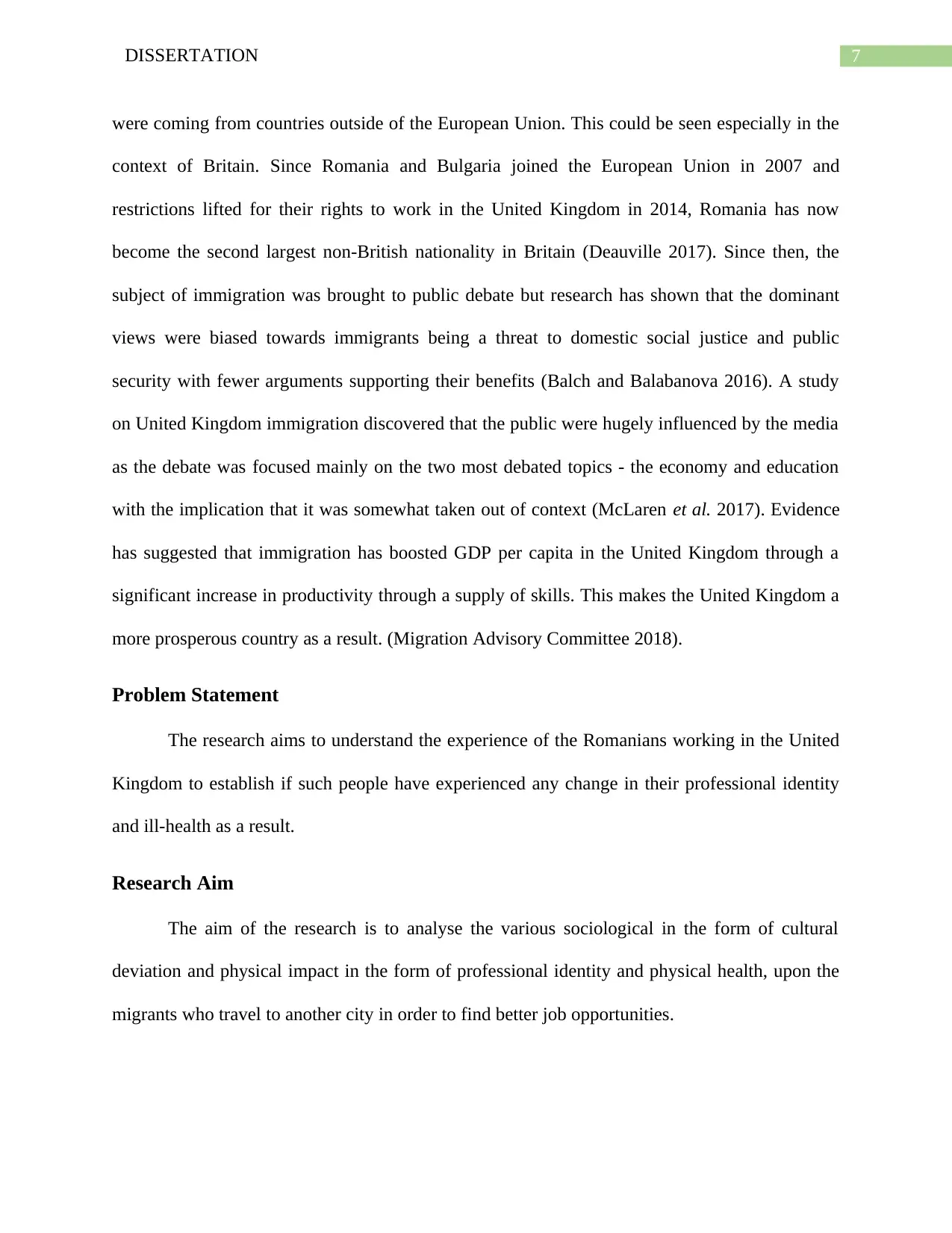
7DISSERTATION
were coming from countries outside of the European Union. This could be seen especially in the
context of Britain. Since Romania and Bulgaria joined the European Union in 2007 and
restrictions lifted for their rights to work in the United Kingdom in 2014, Romania has now
become the second largest non-British nationality in Britain (Deauville 2017). Since then, the
subject of immigration was brought to public debate but research has shown that the dominant
views were biased towards immigrants being a threat to domestic social justice and public
security with fewer arguments supporting their benefits (Balch and Balabanova 2016). A study
on United Kingdom immigration discovered that the public were hugely influenced by the media
as the debate was focused mainly on the two most debated topics - the economy and education
with the implication that it was somewhat taken out of context (McLaren et al. 2017). Evidence
has suggested that immigration has boosted GDP per capita in the United Kingdom through a
significant increase in productivity through a supply of skills. This makes the United Kingdom a
more prosperous country as a result. (Migration Advisory Committee 2018).
Problem Statement
The research aims to understand the experience of the Romanians working in the United
Kingdom to establish if such people have experienced any change in their professional identity
and ill-health as a result.
Research Aim
The aim of the research is to analyse the various sociological in the form of cultural
deviation and physical impact in the form of professional identity and physical health, upon the
migrants who travel to another city in order to find better job opportunities.
were coming from countries outside of the European Union. This could be seen especially in the
context of Britain. Since Romania and Bulgaria joined the European Union in 2007 and
restrictions lifted for their rights to work in the United Kingdom in 2014, Romania has now
become the second largest non-British nationality in Britain (Deauville 2017). Since then, the
subject of immigration was brought to public debate but research has shown that the dominant
views were biased towards immigrants being a threat to domestic social justice and public
security with fewer arguments supporting their benefits (Balch and Balabanova 2016). A study
on United Kingdom immigration discovered that the public were hugely influenced by the media
as the debate was focused mainly on the two most debated topics - the economy and education
with the implication that it was somewhat taken out of context (McLaren et al. 2017). Evidence
has suggested that immigration has boosted GDP per capita in the United Kingdom through a
significant increase in productivity through a supply of skills. This makes the United Kingdom a
more prosperous country as a result. (Migration Advisory Committee 2018).
Problem Statement
The research aims to understand the experience of the Romanians working in the United
Kingdom to establish if such people have experienced any change in their professional identity
and ill-health as a result.
Research Aim
The aim of the research is to analyse the various sociological in the form of cultural
deviation and physical impact in the form of professional identity and physical health, upon the
migrants who travel to another city in order to find better job opportunities.
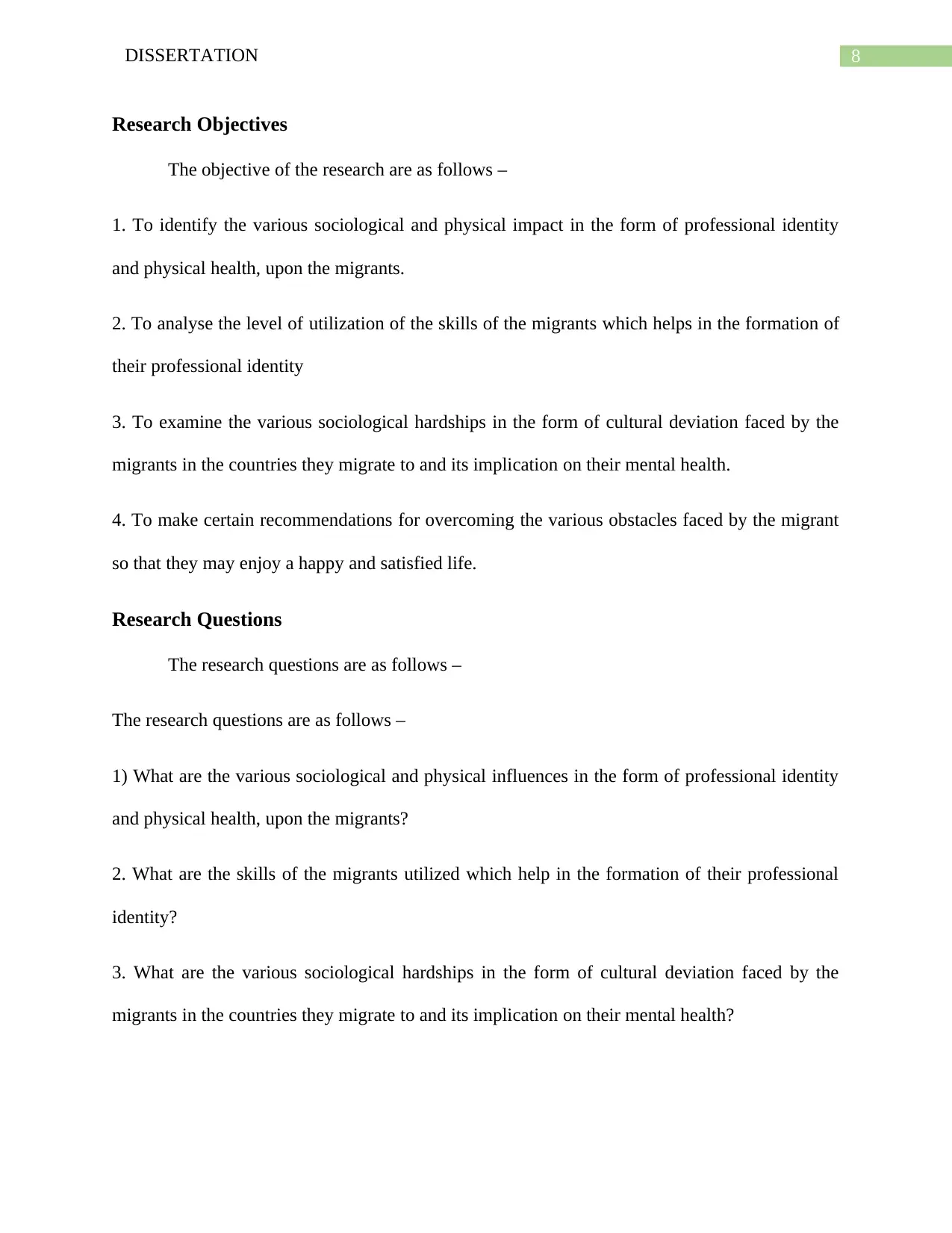
8DISSERTATION
Research Objectives
The objective of the research are as follows –
1. To identify the various sociological and physical impact in the form of professional identity
and physical health, upon the migrants.
2. To analyse the level of utilization of the skills of the migrants which helps in the formation of
their professional identity
3. To examine the various sociological hardships in the form of cultural deviation faced by the
migrants in the countries they migrate to and its implication on their mental health.
4. To make certain recommendations for overcoming the various obstacles faced by the migrant
so that they may enjoy a happy and satisfied life.
Research Questions
The research questions are as follows –
The research questions are as follows –
1) What are the various sociological and physical influences in the form of professional identity
and physical health, upon the migrants?
2. What are the skills of the migrants utilized which help in the formation of their professional
identity?
3. What are the various sociological hardships in the form of cultural deviation faced by the
migrants in the countries they migrate to and its implication on their mental health?
Research Objectives
The objective of the research are as follows –
1. To identify the various sociological and physical impact in the form of professional identity
and physical health, upon the migrants.
2. To analyse the level of utilization of the skills of the migrants which helps in the formation of
their professional identity
3. To examine the various sociological hardships in the form of cultural deviation faced by the
migrants in the countries they migrate to and its implication on their mental health.
4. To make certain recommendations for overcoming the various obstacles faced by the migrant
so that they may enjoy a happy and satisfied life.
Research Questions
The research questions are as follows –
The research questions are as follows –
1) What are the various sociological and physical influences in the form of professional identity
and physical health, upon the migrants?
2. What are the skills of the migrants utilized which help in the formation of their professional
identity?
3. What are the various sociological hardships in the form of cultural deviation faced by the
migrants in the countries they migrate to and its implication on their mental health?
⊘ This is a preview!⊘
Do you want full access?
Subscribe today to unlock all pages.

Trusted by 1+ million students worldwide
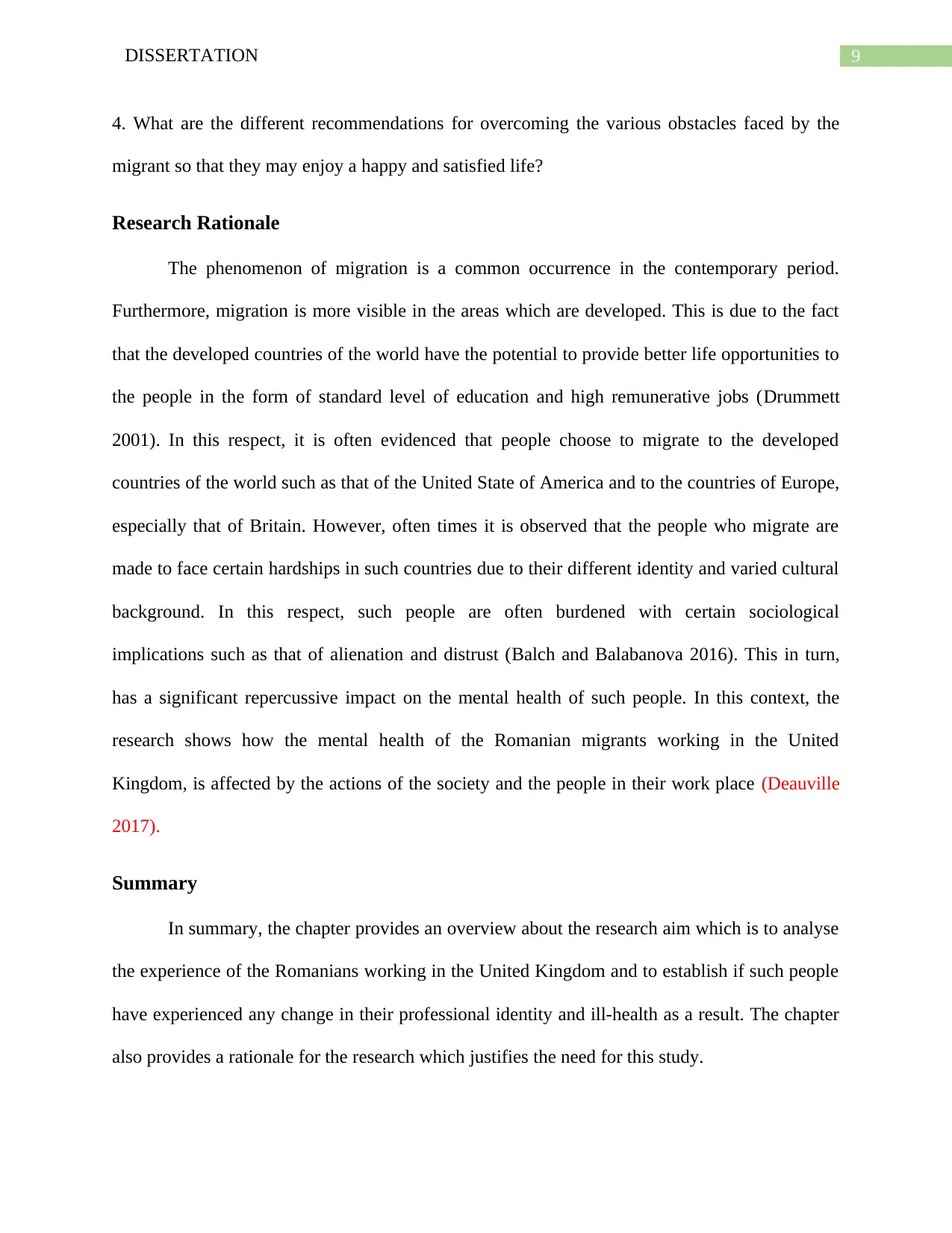
9DISSERTATION
4. What are the different recommendations for overcoming the various obstacles faced by the
migrant so that they may enjoy a happy and satisfied life?
Research Rationale
The phenomenon of migration is a common occurrence in the contemporary period.
Furthermore, migration is more visible in the areas which are developed. This is due to the fact
that the developed countries of the world have the potential to provide better life opportunities to
the people in the form of standard level of education and high remunerative jobs (Drummett
2001). In this respect, it is often evidenced that people choose to migrate to the developed
countries of the world such as that of the United State of America and to the countries of Europe,
especially that of Britain. However, often times it is observed that the people who migrate are
made to face certain hardships in such countries due to their different identity and varied cultural
background. In this respect, such people are often burdened with certain sociological
implications such as that of alienation and distrust (Balch and Balabanova 2016). This in turn,
has a significant repercussive impact on the mental health of such people. In this context, the
research shows how the mental health of the Romanian migrants working in the United
Kingdom, is affected by the actions of the society and the people in their work place (Deauville
2017).
Summary
In summary, the chapter provides an overview about the research aim which is to analyse
the experience of the Romanians working in the United Kingdom and to establish if such people
have experienced any change in their professional identity and ill-health as a result. The chapter
also provides a rationale for the research which justifies the need for this study.
4. What are the different recommendations for overcoming the various obstacles faced by the
migrant so that they may enjoy a happy and satisfied life?
Research Rationale
The phenomenon of migration is a common occurrence in the contemporary period.
Furthermore, migration is more visible in the areas which are developed. This is due to the fact
that the developed countries of the world have the potential to provide better life opportunities to
the people in the form of standard level of education and high remunerative jobs (Drummett
2001). In this respect, it is often evidenced that people choose to migrate to the developed
countries of the world such as that of the United State of America and to the countries of Europe,
especially that of Britain. However, often times it is observed that the people who migrate are
made to face certain hardships in such countries due to their different identity and varied cultural
background. In this respect, such people are often burdened with certain sociological
implications such as that of alienation and distrust (Balch and Balabanova 2016). This in turn,
has a significant repercussive impact on the mental health of such people. In this context, the
research shows how the mental health of the Romanian migrants working in the United
Kingdom, is affected by the actions of the society and the people in their work place (Deauville
2017).
Summary
In summary, the chapter provides an overview about the research aim which is to analyse
the experience of the Romanians working in the United Kingdom and to establish if such people
have experienced any change in their professional identity and ill-health as a result. The chapter
also provides a rationale for the research which justifies the need for this study.
Paraphrase This Document
Need a fresh take? Get an instant paraphrase of this document with our AI Paraphraser

10DISSERTATION
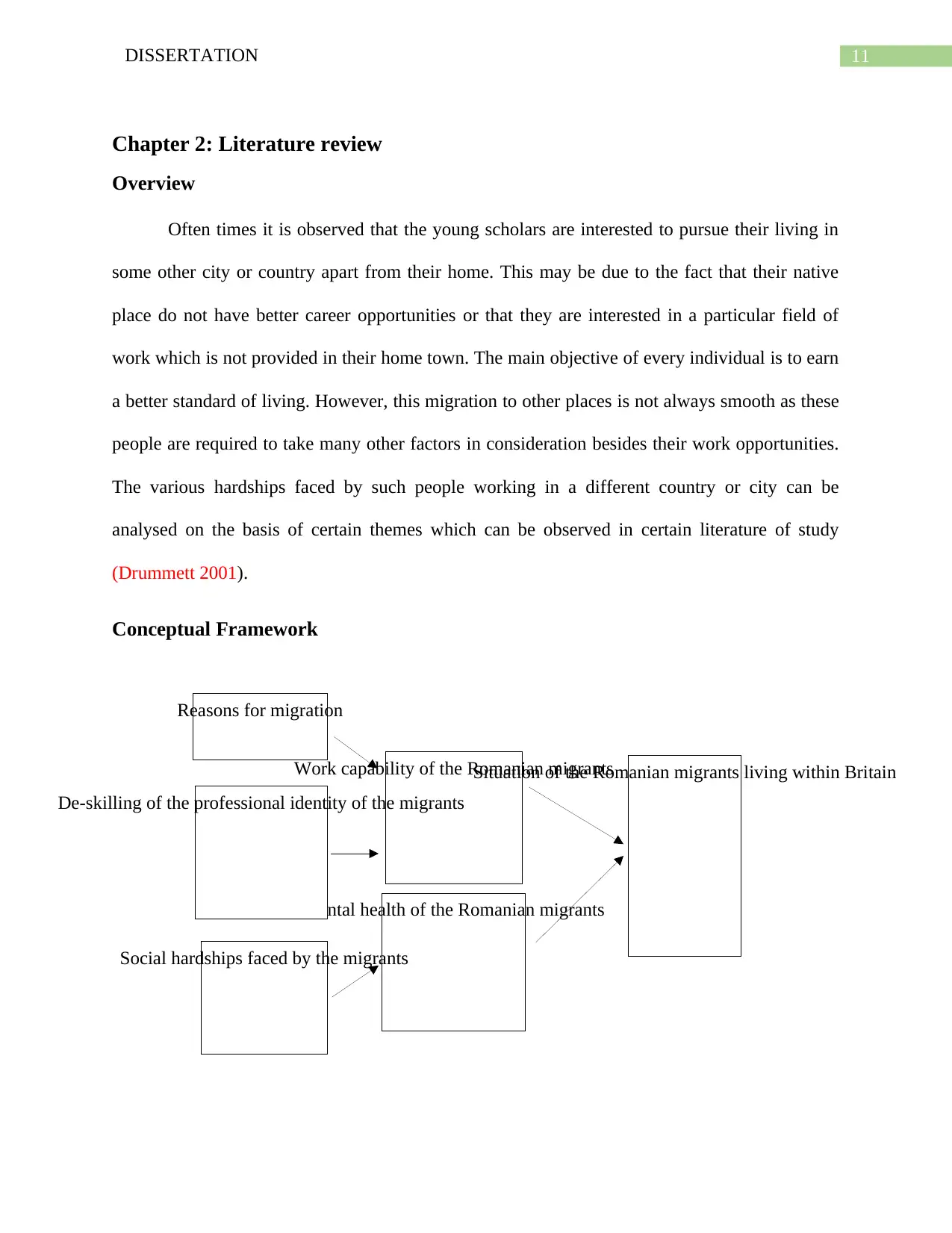
11DISSERTATION
Work capability of the Romanian migrants
Reasons for migration
Mental health of the Romanian migrants
De-skilling of the professional identity of the migrants
Situation of the Romanian migrants living within Britain
Social hardships faced by the migrants
Chapter 2: Literature review
Overview
Often times it is observed that the young scholars are interested to pursue their living in
some other city or country apart from their home. This may be due to the fact that their native
place do not have better career opportunities or that they are interested in a particular field of
work which is not provided in their home town. The main objective of every individual is to earn
a better standard of living. However, this migration to other places is not always smooth as these
people are required to take many other factors in consideration besides their work opportunities.
The various hardships faced by such people working in a different country or city can be
analysed on the basis of certain themes which can be observed in certain literature of study
(Drummett 2001).
Conceptual Framework
Work capability of the Romanian migrants
Reasons for migration
Mental health of the Romanian migrants
De-skilling of the professional identity of the migrants
Situation of the Romanian migrants living within Britain
Social hardships faced by the migrants
Chapter 2: Literature review
Overview
Often times it is observed that the young scholars are interested to pursue their living in
some other city or country apart from their home. This may be due to the fact that their native
place do not have better career opportunities or that they are interested in a particular field of
work which is not provided in their home town. The main objective of every individual is to earn
a better standard of living. However, this migration to other places is not always smooth as these
people are required to take many other factors in consideration besides their work opportunities.
The various hardships faced by such people working in a different country or city can be
analysed on the basis of certain themes which can be observed in certain literature of study
(Drummett 2001).
Conceptual Framework
⊘ This is a preview!⊘
Do you want full access?
Subscribe today to unlock all pages.

Trusted by 1+ million students worldwide
1 out of 49
Related Documents
Your All-in-One AI-Powered Toolkit for Academic Success.
+13062052269
info@desklib.com
Available 24*7 on WhatsApp / Email
![[object Object]](/_next/static/media/star-bottom.7253800d.svg)
Unlock your academic potential
Copyright © 2020–2025 A2Z Services. All Rights Reserved. Developed and managed by ZUCOL.





